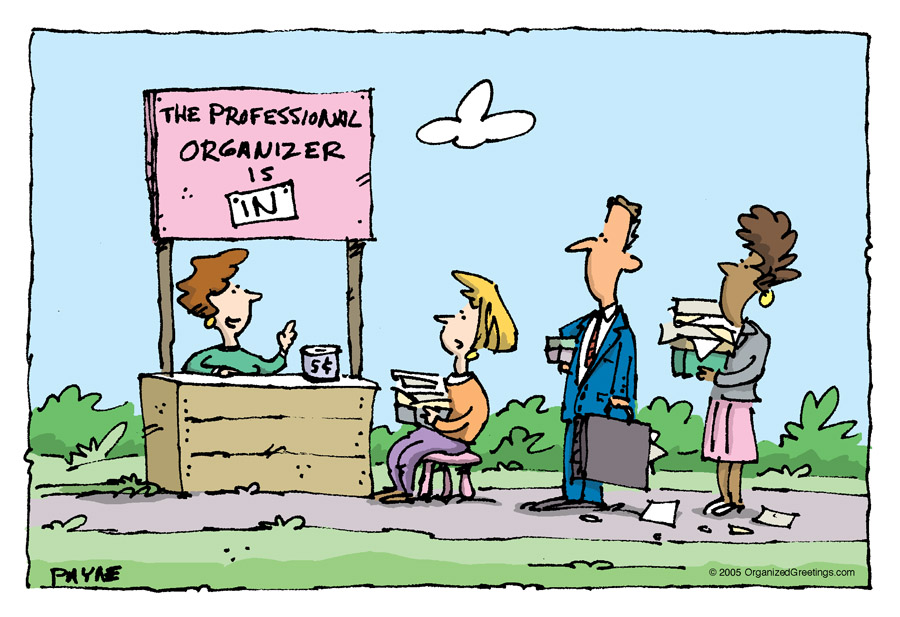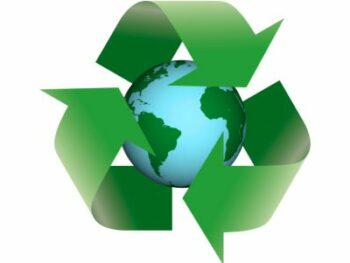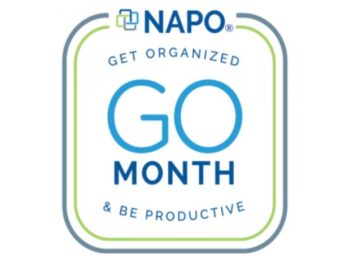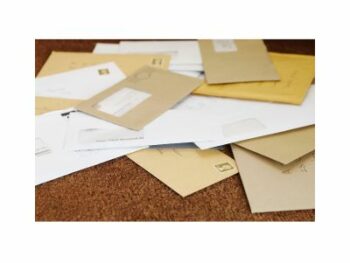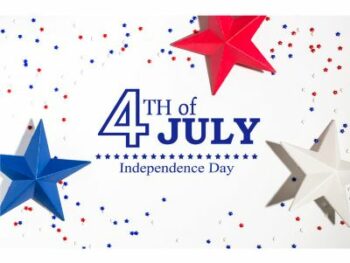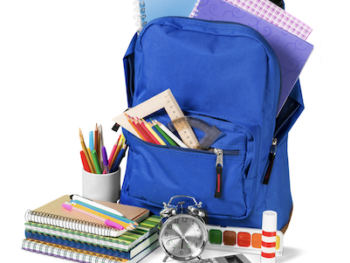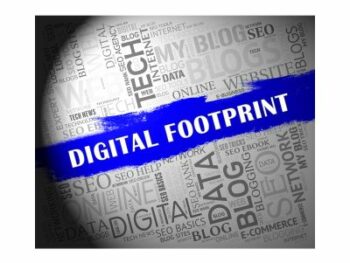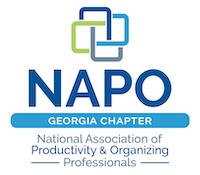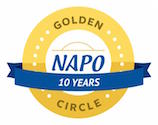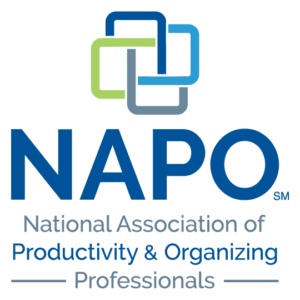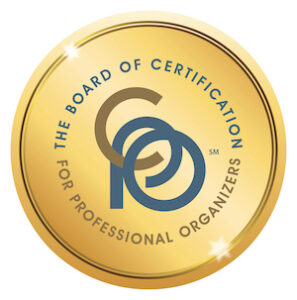In each of my speaking engagements, I make a point of sharing some of the benefits of taking time to get more organized. You can easily find things, save time and money, reduce stress and anxiety levels and become more productive. Getting organized benefits the environment as well. By following the three Rs (reduce, reuse, recycle), you’ll use fewer natural resources, discover new uses for old things, and find fresh homes for your castoffs. Sounds great, right? But how to get started? This blog post will help you make smart purchasing decisions, minimize waste, and make Mother Earth very happy.
FIRST STEP: REDUCE
Follow these tips to tackle the first “R.” You’ll earn key benefits like saving money, time, and natural resources, as well as feeling less cluttered and stressed at home and work.
Thinking before you buy benefits the environment. Studies show that 80 percent of what we use comes from 20 percent of what we own. That means that 80 percent of the things in our homes are rarely or never used. Next time, before you buy, think about the time you’ll spend cleaning, storing, and maintaining that item after you bring it home. If you must buy, establish a “new item in, old item out” system where some purging takes place before shopping, meaning less clutter in your home.
Reduce waste at the office. Try to generate less paper by printing less and saving more to electronic storage. Send an e-mail rather than a printed memo or letter. Think before you hit “print” and you’ll have less paper to deal with on your desk.
Purchase items that have less packaging. Buy concentrates, such as orange juice and laundry detergent. Avoid single-serving products and buy in bulk instead. Reuse paper or plastic shopping bags or bring your own sturdy cloth tote, thus reducing a messy pile of bags littering your home.
Reduce travel toxins. Opt for walking, biking, or taking the bus or subway over driving a car. Try to combine trips when running errands to save time, money, and natural resources.
SECOND STEP: REUSE
Finding creative new uses for your things not only benefits the environment but is also fun and allows you to stay organized!
Make old furniture new again. A can of colorful spray paint can liven up an old picture frame. A coat of glossy paint can transform an old dresser into something new and fabulous.
Hold a clothing swap with friends. Invite some pals to a clothing exchange party. Have each person bring 5-10 items she no longer wears and swap them over music and hors d’oeuvres. Everyone leaves with a free new wardrobe! Send the leftovers to a local charity.
Shop smart. When you need something, consider buying it used at a secondhand store. You can find everything from upscale clothing to furniture, books, building supplies, and more.
Rotate toys. If you have kids, send Barbie on a vacation for a while, let the stuffed animals hibernate, and let some games take a time-out. Bring those toys out a few months later and they’ll seem like new.
Create your own organizing containers. Rather than spend tons of money on plastic organizing bins, drawer dividers, and wicker baskets, reinvent common household items: The small boxes that your checks come in make great drawer dividers. Oatmeal boxes nicely hold art supplies like crayons and pencils. An ice cube tray neatly divides earrings or holds desk supplies like paper clips and tacks. Look around your home and see what inspires you!
LAST STEP: RECYCLE
Holding onto things “just in case” is not enough reason to keep them. By letting go, you’ll find that most of the time you’ll never need those things again, and you’ll enjoy the freedom of uncluttered, open spaces. But throwing things out is bad for the environment, so find ways to recycle clothing, household items, and much more.
Here is a partial list of donation organizations we recommend. Put It There has a lengthy list of donation organizations located in the Atlanta area to choose from. Contact us for help finding the right organization for you because donating allows others to use items you no longer need, which in turn benefits the environment.
HOUSEHOLD ITEMS:
Goodwill – They accept furniture, cars, clothing, books, toys, and much, much more.
Community Assistance Center– They accept donations of clean, gently worn clothes, shoes, accessories, linens, small home goods and furniture in good condition. All donations are tax deductible.
Furniture Bank of Atlanta– Furniture donations in small quantities can be dropped off M-F from 1pm-3pm. Large quantity donation drop offs and moving truck drop offs need to be scheduled in advance. To schedule a large quantity drop off, please email Jeff Rahuba at jrahuba@furniturebankatlanta.org.
BUSINESS CLOTHING:
Dress for Success – They accept donations EVERY OTHER Monday from 10am-2pm ONLY at our Sandy Springs office (6255 Barfield Rd. Suite 155). Our clients’ needs are dynamic, so please be aware that the list of most needed items does change as client needs change. In order to ensure that we are able to provide interview and employment attire for every client that comes through our doors, it is imperative that our inventory be size inclusive and quality assured.
Men Wear Inc. – They accept men’s clothing as well as retail fixtures, office supplies and up to date technology.
CLOTHES, TOYS AND EQUIPMENT:
Foster Care Support Foundation – We need in-kind goods of new, like-new, and gently used items to provide for children in foster and relative care. Donations are accepted at the Mansell Place Distribution Center BY APPOINTMENT ONLY
Lost & Found Youth – We accept new and used goods from the community to support our self-sustaining solution to end LGBTQ youth homelessness in Atlanta. Donations are received Monday through Saturday 10:00AM to 5:00PM and Sunday 10:00AM to 3:00PM and can be deducted for tax purposes. Just ask our store staff for a receipt at the time of your donation.
Stuffed Animals for Emergencies – Stuffed Animals For Emergencies (SAFE) is a 25-year-old nonprofit that is run entirely by volunteers. Our volunteers take in donations of new and gently used stuffed animals, blankets, books, children’s clothes, and baby items, cleans these items, and then finds organizations in their area who can use the donations for children in traumatic or emotional situations. You, the donor, can be sure that any donations that come through SAFE are never sold and are given directly to children in need.
LensCrafters and local Lions Clubs accept used eyeglasses.
ART SUPPLIES:
Try your local Parks and Recreation Department and local elementary schools to donate anything that could be used for art projects for children. Also try your local museums.
There you have it, the 3 Rs towards protecting Mother Earth and how organizing benefits the environment. Happy Earth Day!
Certain paragraphs of this blog post are courtesy of Sara Pedersen, of Time2Organize, whose articles I have purchased for use.© 2010 Articles on Demand™




